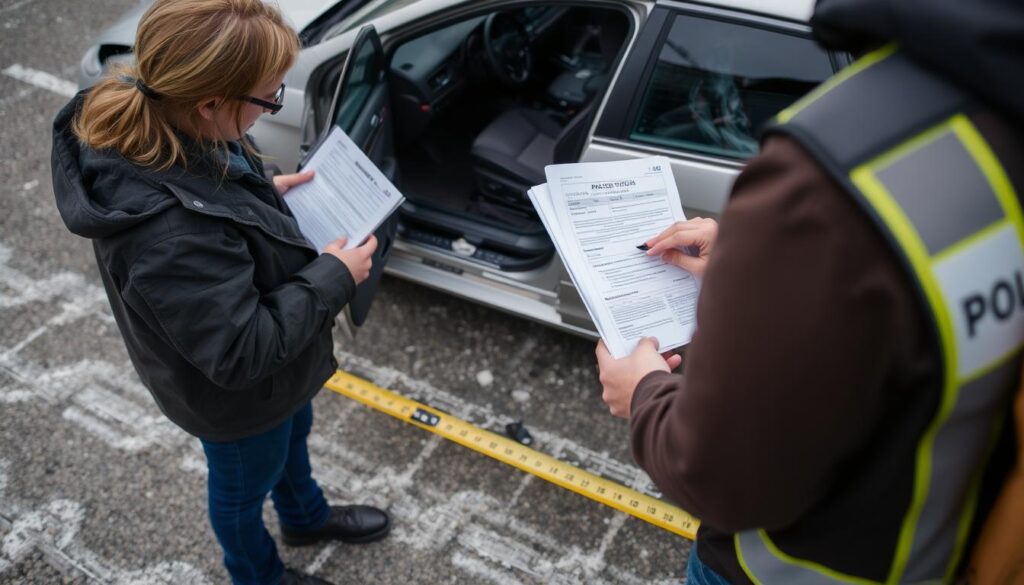Florida’s law on comparative negligence helps figure out who’s at fault in personal injury cases. It lets courts decide how much blame each side has. Knowing about comparative negligence is key for those looking for compensation in Florida.
This concept is a big deal in Florida’s legal world. It shapes the results of many cases.
In Florida, comparative negligence helps figure out how much fault is in accidents. This affects how much money the injured person gets. This guide aims to explain comparative negligence in Florida. It’s to help people understand the system and its effects on their cases.
Important parts of Florida’s comparative negligence include how much money you can get based on fault. These rules are key to figuring out what compensation you might get. By learning about comparative negligence, you can know your rights and what might happen in your case.
Key Takeaways
- Comparative negligence is a crucial concept in Florida law for determining fault in personal injury cases.
- The system assigns a percentage of blame to each party involved in an accident.
- Understanding comparative negligence is vital for individuals seeking compensation under Florida law.
- The degree of fault assessed under comparative negligence impacts the amount of damages awarded.
- Florida’s comparative negligence system includes a percentage-based recovery system and maximum recovery thresholds.
- Grasping the principles of comparative negligence helps individuals understand their rights and potential case outcomes under Florida law.
Understanding Florida’s Comparative Negligence Law
Understanding negligence cases means knowing about comparative negligence. This rule splits fault among those involved in an accident. It changes how much money you might get. In Florida, knowing this law is key to getting a fair deal.
Let’s look at what makes up comparative negligence law. These are the main parts:
- Definition: It’s about how much fault each person has in an accident.
- Basic Principles: The goal is to share fault fairly based on who’s more responsible.
- Historical Development: Florida’s law has changed a lot, affecting how cases are solved.
Knowing about comparative negligence helps you deal with negligence cases in Florida. It lets you make smart choices and get the right amount of money for your losses.
Exploring comparative negligence law shows its importance in negligence cases. It’s crucial for protecting your rights and getting the compensation you need.
| Component | Description |
|---|---|
| Definition | Refers to the degree of fault assigned to each party |
| Basic Principles | Aims to allocate fault based on percentage of responsibility |
| Historical Development | Evolved over time, impacting how negligence cases are handled |
How Fault is Determined Under Florida Law
In Florida, fault determination is key in cases where more than one party is involved. The court looks at many things to figure out who was more at fault. These include what each party did, the situation around the incident, and any laws that apply.
To decide on negligence, the court checks if each party was careful enough to avoid harm. This is important to know how much fault to assign to each side. Sometimes, the court uses expert opinions, witness statements, and other evidence to make its decision.
- Right-of-way rules
- Weather and road conditions
- Vehicle maintenance and safety features
The court carefully looks at these factors to decide on negligence. This decision affects how much money someone might get in damages.
| Factor | Description |
|---|---|
| Speed and distance | Evaluating whether the parties were driving at a safe speed and maintaining a safe distance |
| Right-of-way rules | Assessing whether the parties followed right-of-way rules, such as yielding to pedestrians or other vehicles |
| Weather and road conditions | Considering the impact of weather and road conditions on the incident, such as rain, snow, or potholes |
The Impact of Modified Comparative Negligence on Recovery
Understanding the impact of modified comparative negligence on recovery is key in personal injury cases. This system lets people get compensation, even if they’re partly to blame. Knowing about the percentage-based recovery system and maximum recovery limits is crucial.
In Florida, this system decides how much damages a person can get. The amount depends on the fault percentage. For instance, if someone is 20% at fault, they can get 80% of their damages.
Percentage-Based Recovery System
This system aims to fairly share damages. It assigns fault percentages to each party. This way, no one is unfairly punished for their part in the accident.
Maximum Recovery Thresholds
There are also limits on how much damages a person can get. These limits are set to prevent excessive compensation. For example, in Florida, there’s a cap on non-economic damages like pain and suffering.
It’s vital to understand how modified comparative negligence affects recovery. Working with a skilled attorney can help. They can guide you through the process of figuring out fault and getting damages. This ensures you get fair compensation, even if you’re partly to blame, and aids in your recovery.
Common Types of Cases Affected by Comparative Negligence
Comparative negligence is key in many cases, like personal injury and negligence cases. These cases often have many parties at fault. It’s important to know how comparative negligence works in different situations for those seeking compensation.
Some common cases include:
- Car accidents: Where multiple drivers may be partially at fault
- Slip and fall accidents: Where property owners and individuals may share blame
- Medical malpractice cases: Where healthcare professionals and patients may be partially responsible
In negligence cases, courts figure out how much fault each party has. This affects how much money they get. For example, if someone is 20% at fault in a personal injury case, they get 20% less money.
Understanding comparative negligence in different situations is crucial. It helps people navigate legal issues better. Knowing which cases are affected by comparative negligence helps prepare for legal outcomes in negligence cases.
| Case Type | Example | Potential Outcome |
|---|---|---|
| Car Accident | Driver A is 30% at fault, Driver B is 70% at fault | Driver A’s compensation reduced by 30% |
| Slip and Fall | Property owner is 40% at fault, individual is 60% at fault | Individual’s compensation reduced by 60% |
Calculating Damages Under Comparative Negligence
When figuring out damages under comparative negligence, it’s key to look at both economic and non-economic damages. Economic damages are things like medical bills, lost wages, and damage to property. Non-economic damages include pain and suffering, emotional distress, and the loss of enjoying life.
In Florida, courts use a percentage system to figure out damages. This means the amount the plaintiff gets is less if they’re partly to blame. For instance, if the plaintiff is 20% at fault, they get 20% less.
Let’s say the plaintiff wants $100,000 but is 20% at fault. The court would cut their award to $80,000. This shows why understanding how damages are figured out is so important.
| Type of Damages | Description | Example |
|---|---|---|
| Economic Damages | Medical expenses, lost wages, property damage | $10,000 in medical bills |
| Non-Economic Damages | Pain and suffering, emotional distress, loss of enjoyment of life | Pain and suffering after a car accident |
Knowing how damages are figured out under comparative negligence helps people get the right compensation. It makes the recovery process clearer and fairer.
Evidence Required to Prove Negligence in Florida
To prove negligence in Florida, you need to collect enough evidence. This includes witness statements, medical records, and expert opinions. The aim is to show that the defendant’s actions caused the plaintiff’s injuries or damages.
Some common evidence in negligence cases are:
- Police reports and accident scene investigations
- Medical records and bills
- Testimony from witnesses and experts
- Photographs and videos of the accident scene
In negligence cases, it’s key to show a clear link between the defendant’s actions and the plaintiff’s damages. This needs a detailed look at the evidence and a good grasp of Florida’s laws.

With strong evidence and a clear understanding of the law, plaintiffs can get fair compensation. It’s vital to have an experienced attorney. They can help gather and present the evidence well.
The Role of Insurance Companies in Comparative Negligence Cases
In cases of comparative negligence, insurance companies have a big role. They aim to pay out as little as possible. It’s key to know how they try to settle cases and why getting legal representation is important for a fair deal.
Insurance companies use different ways to lower what they have to pay. These methods include:
- Offering low settlement amounts
- Delaying the negotiation process
- Requesting too much documentation
To get the most from a settlement, understanding the negotiation process is crucial. Getting legal representation can greatly help. A good lawyer can protect your rights and make sure you get what you deserve.
In summary, insurance companies are key in comparative negligence cases. Their tactics can affect the outcome. By knowing these tactics and getting legal representation, you can get a fair deal.
| Insurance Company Strategies | Individual’s Response |
|---|---|
| Offering low settlement amounts | Seeking legal representation to negotiate a fair settlement |
| Delaying the negotiation process | Staying informed and proactive throughout the process |
| Requesting excessive documentation | Providing thorough and accurate documentation to support the claim |
Time Limits and Legal Deadlines
In Florida, knowing the time limits for comparative negligence cases is key. The statute of limitations sets a time frame for filing a case. For personal injury cases, Florida gives you four years from the accident date. But, this time can change based on your case’s details.
It’s important to know the legal deadlines to file your case on time. If you miss this, your case could be dismissed. You might lose your chance to get compensation. To file, you need to submit a complaint to the court. This document should include the accident details, who was involved, and the damages you’re seeking.
Key Considerations
- The statute of limitations for personal injury cases in Florida is four years from the date of the accident.
- The filing requirements involve submitting a complaint to the court, which outlines the details of the accident and the damages being sought.
- Missing the deadline can result in the case being dismissed, and you may be barred from seeking compensation.
It’s crucial to talk to an attorney who knows Florida’s comparative negligence laws. They can make sure your case is filed correctly and on time. This way, you can get the compensation you deserve.
In summary, knowing the time limits and legal deadlines is essential in Florida’s comparative negligence cases. By understanding the statute of limitations and filing requirements, you can file your case on time. This ensures you get the compensation you deserve.
| Case Type | Statute of Limitations | Filing Requirements |
|---|---|---|
| Personal Injury | 4 years from the date of the accident | Submit a complaint to the court |
| Property Damage | 4 years from the date of the accident | Submit a complaint to the court |
Steps to Protect Your Rights After an Accident
After an accident, it’s crucial to act fast to protect your rights. First, get medical help, even if you don’t feel hurt badly. Some injuries might not show up right away. Protecting rights is key to getting the compensation you need.
In negligence cases, keeping evidence is very important. Take photos of the accident scene, get witness statements, and keep track of accident-related costs. This evidence helps build a strong case and protects your rights.
To protect your rights, consider these steps:
- Seek medical attention immediately
- Preserve evidence, including photos and witness statements
- Consult with a lawyer experienced in negligence cases
By following these steps, you can safeguard your rights and get the compensation you deserve. Remember, protecting rights after an accident needs quick action and the right advice.
Working with a Legal Professional
Working with a lawyer can be very helpful in comparative negligence cases. They help you understand fault and get compensation. With their help, you can protect your rights and get the damages you deserve.
Lawyers are great at negotiating with insurance companies. Insurance companies often try to pay out less, but a lawyer can fight for a fair deal. They also help gather evidence and build a strong case.
When to Hire an Attorney
It’s important to get a lawyer right after an accident. They can start investigating and gathering evidence quickly. You should consider hiring a lawyer if:
- It’s a severe accident or injury
- You’re dealing with complex insurance claims
- You’re not sure about your rights or the legal process
What to Expect from Legal Representation
When you work with a lawyer, they handle everything from investigating to negotiating. They explain the legal process and keep you updated. The benefits of having a lawyer include:
| Benefits | Description |
|---|---|
| Expert Knowledge | Lawyers know the law well and guide you through the compensation process. |
| Increased Compensation | They work to get you the highest damages possible, leading to more compensation. |
| Reduced Stress | Lawyers take care of your case, reducing your stress and letting you focus on healing. |
Conclusion: Maximizing Your Recovery Under Florida’s Comparative Negligence System
Understanding Florida’s comparative negligence law is key if you want to get damages after an accident. Knowing how this law works helps you deal with your case better. Even if you were partly to blame, you might still get some compensation based on the other party’s fault.
When you’re ready, find a good personal injury lawyer. They can look at your case and help you through the legal steps. With their help, you can get the evidence you need, talk to insurance companies, and protect your rights. Taking these steps can help you get the best outcome and the compensation you deserve.


